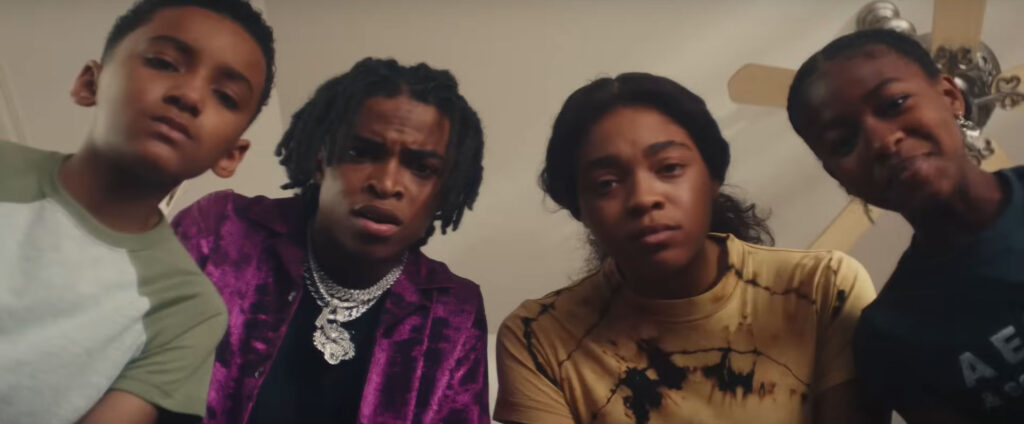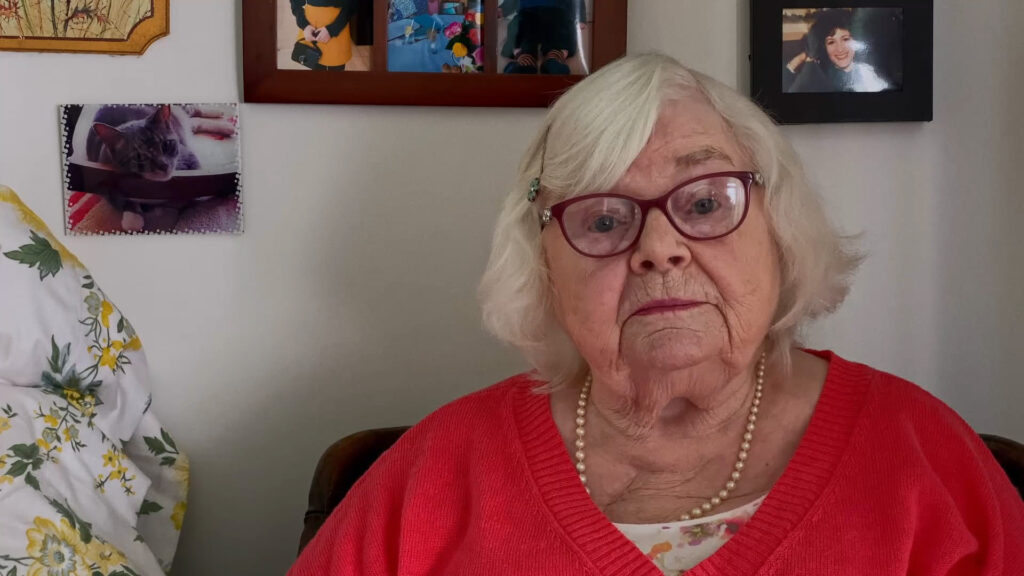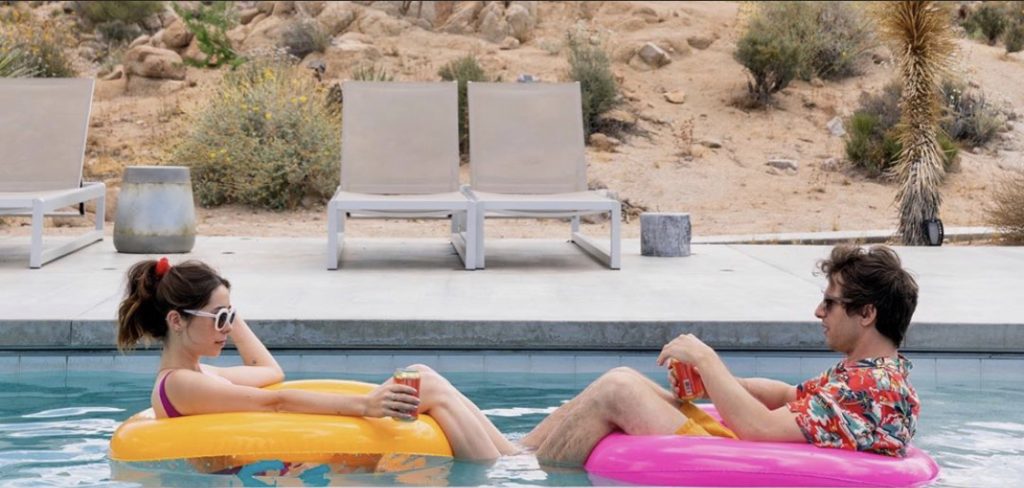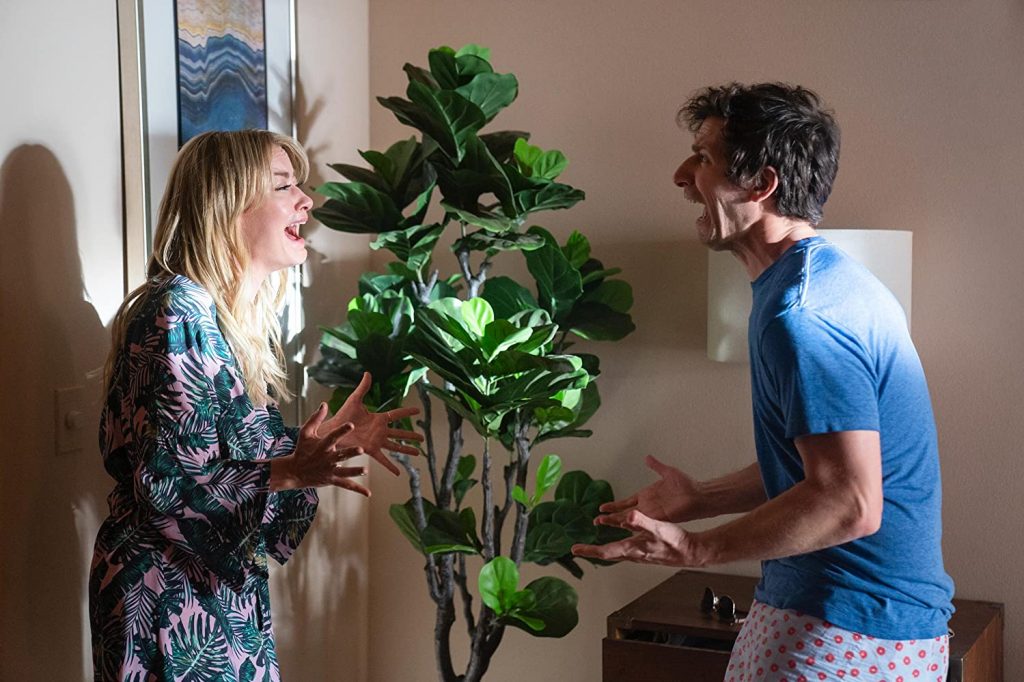April 19, 2024
by Carla Hay

“Don’t Tell Mom the Babysitter’s Dead” (2024)
Directed by Wade Allain-Marcus
Culture Representation: Taking place in Los Angeles, the comedy film “Don’t Tell Mom the Babysitter’s Dead” (a remake of the 1991 film of the same name) features a predominantly African American cast of characters (with some white people) representing the working-class, middle-class and wealthy.
Culture Clash: Four siblings under the age of 18 go unsupervised after their widowed mother goes away on a two-month trip, the kids’ babysitter dies, and the eldest sibling lies about her age and qualifications to get jobs when the kids run out of money.
Culture Audience: “Don’t Tell Mom the Babysitter’s Dead” will appeal primarily to people who are fans of the original movie and are interested in watching an unimaginative remake with no surprises.

“Don’t Tell Mom the Babysitter’s Dead” is comatose with a lack of imagination. This unnecessary remake of the 1991 film is in many ways worse than the original film because the remake adds terrible racial jokes and more moronic scenarios. The acting performances from the cast is very uneven, ranging from mediocre to painfully bad.
Directed by Wade Allain-Marcus and written by Chuck Hayward, the 2024 “Don’t Tell Mom the Babysitter’s Dead” remake is based on the 1991 movie of the same name. Christina Applegate starred in the original 1991 movie, which was directed by Stephen Herek and was written by Neil Landau and Tara Ison. This unimpressive reboot is geared to adults (even though the central characters are children) and is more vulgar than the original 1991 version, due to more cursing and more explicit depictions of drug use, mostly marijuana. However, the 2024 version of “Don’t Tell Mom the Babysitter’s Dead” doesn’t do a very good job of using this adult-oriented tone by making anything edgy or clever. Instead, it rehashes the original movie in tired and lazy ways that are definitely not improvements from the original.
In the 2024 remake of “Don’t Tell Mom the Babysitter’s Dead,” there are four siblings at the center of the story, instead of five siblings that were in the original 1991 movie. The eldest child, who is the chief protagonist, is a 17-year-old girl who has recently graduated from high school. With few exceptions, the names of the main characters and prominent supporting characters are the same in the original and in the remake of “Don’t Tell Mom the Babysitter’s Dead.”
In the 2024 remake of “Don’t Tell Mom the Babysitter’s Dead” (which is a production from BET Studios), most of the updates are references to social media that didn’t exist in 1991. However, the overall concept is the same in both movies: The kid siblings are left alone for two months because their single mother is away on a retreat vacation during the summer season. The eldest sibling is resentful because she wanted to take a summer vacation with her friends, but she now has to spend the summer with her younger siblings.
A cranky and strict elderly babysitter has been hired to look after the children and live in the house with them, but she unexpectedly dies of natural causes just a few days after she arrives. The kids get rid of the babysitter’s body and keep the death a secret because they don’t want their mother to cut her vacation short and because the kids want to be unsupervised for the two months that their mother will be away. The comedic situations in the movie have mostly to do with what happens because the kids are keeping this secret.
Through a series of circumstances, the siblings run out of the money that their mother left for the babysitter to spend on the children. They decide the eldest child is the most likely to earn the most money by getting a job. The eldest child pretends to be about 10 years older than she really is and creates false qualifications in order to get a job at a fashion apparel company, where she has a demanding boss who is dating a sleazy marketing executive at the company.
The eldest sibling also has a situation where her love life overlaps with her work life: She starts dating a guy who’s close to her age, and she finds out later that he is the younger brother of the woman who is her enemy at her job. The teen imposter employee doesn’t want her new boyfriend and his sister to find out that she knows both of them. Many hijinks ensue as the amateur teen con artist struggles to keep up several charades while trying to maintain a stable household.
In the 2024 remake of “Don’t Tell Mom the Babysitter’s Dead” (which takes place and was filmed in the Los Angeles area, just like the 1991 original movie), the protagonist siblings are 17-year-old Tanya Crandell (played by Simone Joy Jones), who is outgoing and resourceful; stoner skateboarder Kenny Crandell (played by Donielle T. Hansley Jr.), who’s about 15 or 16; angsty technology whiz Melissa Crandall (played by Ayaamii Sledge), who’s about 13 or 14; and nerdy intellectual Zack Crandell (played by Carter Young), who’s about 11 or 12. Their widowed mother (played by Patricia “Ms. Pat” Williams) doesn’t have a first name in the movie. Tanya, who is set to go to Howard University in the fall, had planned a summer vacation in Spain with friends, but she’s now had to cancel her vacation to stay home with her younger siblings.
In the 1991 original movie, the mother was going on a vacation retreat for relaxing self-care and so she could have this free time to herself. The 2024 remake plays into “angry black woman” negative stereotyping by showing the mother having an irate and violent meltdown at her office job. (She pushes down a heavy piece of furniture while losing her temper in a conference room meeting before she quits the job.) As a result, this volatile mother decides she’s going on a two-month retreat (to Thailand) to work on her anger management issues. The awful racial stereotyping doesn’t stop there, as there are unnecessary and not-funny-at-all racist and sexist jokes polluting the movie, including people saying the “n” word and black females being called “bitch.”
The black people aren’t the only ones who look bad in the 2024 remake. The white babysitter who’s been hired to babysit the Crandell siblings is a blatant racist, who is depicted as a conservative, Bible-carrying Christian. Her name is Mrs. Sturak (played by June Squibb), who shows herself to be mean-spirited and oppressive after the children’s mother leaves for the retreat. Mrs. Sturak is the type of racist who says things such as, “Hip-hop ruined the blacks.” Mrs. Sturak also shoots a gun outside and tells the Crandell kids: “I know how to discipline you. I watch Madea [Tyler Perry] movies.”
Tanya and Kenny decide to rebel and have a house party. They lie to Mrs. Sturak and say that it’s really a gathering of a Bible study group where Christian hip-hop will be played. Kenny (who is cliché of a pothead) invites a lot of his druggie friends, so the party predictably becomes a loud and raucous bash. Mrs. Sturak sees the chaos and looks like she’s about to have a heart attack, but she doesn’t do anything about the party, which doesn’t make sense since she’s the type of person who would call the police to break up the party.
The next morning, the Crandell kids find out that Mrs. Sturak died in her sleep. It’s a slightly different lead-up than the original 1991 movie, where there was no house party to upset Mrs. Sturak. In the 1991 movie, the kids just found out one morning that she was dead in her bed. The way that the kids handle disposing the body is also different in both films.
In the original 1991 movie, the kids drove Mrs. Sturak’s body to a mortuary and anonymously dropped off the corpse in a trunk at the front door, with a note saying that she died of natural causes. In the 2024 movie, the body disposal problem is handled in a way that’s even worse. Melissa says, “It’s not 1991. There are cameras everywhere,” which is the movie’s flimsy way of explaining why they don’t drop the body off at a mortuary.
First, the Crandell kids decide to put Mrs. Sturak’s body in a spare refrigerator in the garage. The movie is so stupid, it leads to an awkward scene where a cop just happens to be passing by the house’s open garage door and asks the kids what they are doing and why they are unsupervised. Kenny is able to talk the cop out of investigating further by saying their mother is out for a few hours at a spa appointment.
The plan for the body disposal then switches to putting Mrs. Sturak’s body in Mrs. Sturak’s car, driving the car to a remote lake at night, and then pushing the car into the lake. Not only is this a more complicated solution, but it also now makes this illegal body disposal an even worse crime than it was in the first movie. And the filmmakers would like viewers to forget that security cameras on the street still work at night.
Mrs. Sturak apparently had no one in her life who cared about her because, in both movies, no one comes looking for or reports her missing during the entire story. Every time the Crandell kids’ mother calls to check up on the kids (which isn’t very often), they tell their mother that Mrs. Sturak is not available to talk on the phone because she out doing an errand. In real life, most parents would then start to wonder why the babysitter is leaving the kids alone every time they call, or the parents would ask the babysitter to return the call and would get suspicious if the babysitter doesn’t call back. But movies like this aren’t concerned with those realistic details.
When the Crandell kids run out of cash, Tanya gets a job as a rideshare driver. While doing this job, she meets a customer in his late teens named Bryan (played by Miles Fowler), who books Tanya to drop him off and pick him up at what appears to be a wedding or engagement party. Bryan is an aspiring architect who has recently graduated from high school and has plans to attend Syracuse University in the fall.
During their time together, Bryan and Tanya have romantic chemistry and they end up dating each other, even though there’s nothing in the movie to show that they have a relationship built on honesty from Tanya. Tanya leads Bryan to believe that she’s older than 17. The minimum age to be a rideshare driver is 18 years old, which is why Bryan assumes Tanya is at least 18. Tanya also tells Bryan many lies, some through omission.
When Bryan asks Tanya why she’s so evasive about certain personal details throughout their relationship, Tayna is very abrupt and defensive to Bryan. Their conversations are also fairly shallow and uninteresting. When Bryan asks Tanya what her favorite building is, she answers, “The Grove,” which is a shopping center in Los Angeles. Bryan is an attentive and romantic boyfriend. Tanya is very self-absorbed and not as intelligent and charismatic as Sue Ellen Crandell (the eldest sibling, played by Applegate) in the original 1991 movie.
The rideshare job is Tanya’s first job. She’s shocked at how much of her payment is reduced by commissions, taxes and expenses. With help from Zack, Tanya does some math and figures out that she won’t be able to make enough money as a rideshare driver to feed a household of four people, so she quits the rideshare job.
In the original 1991 movie, Sue Ellen initially had a job at a fast-food restaurant, but she quit not just because of the low wages but also because she disliked the creepy boss and she hated doing the messy food work involved in the back rooms. She meets her love interest Bryan (played by Josh Charles) because he works at the same fast-food joint. Bryan also drives the restaurant’s delivery truck, which becomes a running gag in the movie when the Crandell car gets stolen by drag queens, and Sue Ellen often has to get rides from Bryan in this gaudy fast-food truck.
A turning point comes in both movies when the eldest Crandell sibling sees an ad for a job opening as a receptionist for a fashion company that sells low-priced apparel. In both movies, she fabricates a résumé to apply for the job. In the 1991 movie, she does it on her own. In the 2024 version, Tanya gets help from her more tech-savvy sister Melissa, who also creates fake social media profiles for Tanya.
Both movies show how the teen imposter gets hired immediately at the company—not as a receptionist but as the administrative assistant to a high-ranking company executive named Rose Lindsey. That’s because this executive is impressed by the qualifications listed on the résumé, and the executive doesn’t like the receptionist who expected to get promoted to this administrative assistant job. In both movies, the receptionist is very rude to the teen imposter when they first meet. The receptionist (who is Bryan’s older sister) becomes the teen imposter’s bitter rival when she finds out that this newcomer got the job that the receptionist wanted.
In the 2024 remake of “Don’t Tell Mom the Babysitter’s Dead,” the receptionist Caroline (played by Lantha Richardson) is a two-dimensional “villain,” although Richardson has fairly good comedic timing in some of the scenes. Caroline’s office sidekick is openly gay Bruce (played by Gus Kenworthy), who doesn’t want to get involved in Caroline’s scheming, unlike the 1991 movie’s Bruce character(played by David Duchovny), who was Caroline’s cohort with a dislike for Sue Ellen because Sue Ellen doesn’t let Bruce talk down to her. Kenworthy has a small role in the 2024 movie, but he and Richardson are two of the few cast members in the movie who give consistently capable performances.
The same can’t be said for Nicole Richie, who has the role of Rose Lindsey, the hard-driving CEO of Libra, a fast-fashion company whose target audience consists of teenage girls. Richie delivers her lines stiffly in too many scenes. You never forget that Richie is acting, unlike Joanna Cassidy, who had a more natural and convincing performance as Rose Lindsey in the original 1991 movie.
The 2024 remake of “Don’t Tell Mom the Babysitter’s Dead” has several references to the original 1991 movie. At one point, it’s revealed that Tanya’s middle names are Sue Ellen. There’s a scene in the remake where Kenny, Melissa and Zack are watching TV in their living room, and the movie they are watching is the original “Don’t Tell Mom the Babysitter’s Dead.”
And there is the not-too-surprising cameos from some of the original “Don’t Tell Mom the Babysitter’s Dead” cast members. Cassidy makes a very brief appearance toward the end of the movie, in a scene where she introduces herself as Joan to Richie’s Rose character. This cameo appearance from Cassidy is so quick (less than one minute) and has no bearing or effect on the overall story, so it’s not spoiler information to say that she’s in the movie. Other cast members from the 1991 movie who make very brief cameos as different characters in the 2024 remake are Keith Coogan (who was stoner Kenny in the original movie) and Danielle Harris (who was tomboy Melissa in the original movie), whose appearances in the 2024 remake are also unimportant to the plot.
One of the reasons why the 2024 remake of “Don’t Tell Mom the Babysitter’s Dead” doesn’t work very well is because the movie’s plot is too outdated. In 1991, it would be much easier for an underage teenager to fake an identity to get this type of job. Nowadays, this type of fakery would be much easier to expose—especially since Tanya used her real name and went to a high school in the same area where she got the job. The 2024 movie tries to address these issues by showing Caroline finding out fairly early on that Tanya lied about her qualifications. However, Rose doesn’t seem to care when Caroline tells Rose because Rose genuinely likes Tanya and wants Tanya to succeed.
As for the underage issue, which is more of a legal issue for the company, the original 1991 movie handled it better. In the 1991 movie, someone on the job finds out Sue Ellen’s real age by temporarily taking her driver’s license from Sue Ellen’s unattended purse and making a photo copy of the driver’s license. In the 2024 movie, it’s discovered that Tanya lied about her age when someone finds her high school yearbook, which actually doesn’t prove she’s underage because someone could be 18 or 19 (or even older, in some cases) when they graduate from high school.
Another issue that is handled in a sloppier way in the 2024 movie is a subplot about the younger Crandell siblings gong on a spending spree to buy things they don’t need (such as high-end home entertainment equipment) by using the company’s expense account that the eldest Crandall sibling has access to through her job. In the 1991 movie, the money was from a petty cash account, with the cash kept in a drawer where Sue Ellen had the keys and could write fake receipts to cover up the taken cash. Sue Ellen took the cash home to buy groceries and had the intention to replace the stolen cash (before anyone noticed the missing cash) with money that she was expecting from her next paychecks.
In the 2024 movie, Tanya is given a company credit card that is used by her younger siblings for the spending sprees. Using a credit card instead of cash would actually make it harder to cover up the purchases that the Crandell kids bought using the stolen money. But the filmmakers of the 2024 remake of “Don’t Tell Mom the Babysitter’s Dead” don’t care about those details because this movie treats viewers like idiots.
In both movies, Rose is openly dating a co-worker marketing executive named Gus, who is a and playboy. John Getz had the role of Gus in the 1991 movie. Jermaine Fowler (no relation to Miles Fowler) is Gus in the 2024 movie, which makes Gus one of Rose’s subordinates. Rose considers herself to be an independent, liberated woman who doesn’t feel the need to get married. However, Rose and Gus have decided to have a monogamous relationship. Rose hopes that Gus will eventually ask her to live together.
This is what the 2024 movie is trying to pass off as “comedic lines of dialogue”: Gus tells Tanya that he’s “VP [vice president] of pleasing Rose.” Rose tells Tanya in a separate private conversation why she’s dating Gus, who’s about 10 years younger than Rose: “Always date younger men—[they have] more stamina, less opinions.” She also compares Gus to being like a foster puppy if they live together. Rose seems to be fond of Gus, but only because of the sex that they’re having and the control she thinks she has in the relationship.
Because Gus is a serial cheater, he predictably tries to make moves on Tanya, who rebuffs his advances. Tanya also sees Gus kissing another woman, and Tanya handles it in a way that’s kind of cringeworthy. In the 1991 movie, Gus is much more aggressive and blatant with his sexual harassment, which Sue Ellen handles with a certain amount of grit and maturity that people mght not expect from a 17-year-old. The 2024 version “Don’t Tell Mom the Babysitter’s Dead,” in this #MeToo era, plays it very safe when it comes to sexual harassment issues.
Instead, the movie is much more “in your face” with obnoxious racist comments that the movie is trying to pass off as jokes but often miss the mark. There’s a scene early in the 2024 movie, where Kenny says a ridiculous comment that he and his siblings get to have the whole house to themselves like “white kids”—as if black kids are never home alone. The movie briefly acknowledges that the Crandells have middle-class privileges, but then it’s back to the unfunny racist jokes.
In the original 1991 movie, the clothing company was called General Apparel West, selling drab worker uniforms. The 2024 movie mentions environmental and social issues that the general public is much more conscious of for fashion companies in the 21st century, compared to 1991—such as sustainable manufacturing, vegan clothing and using underpaid sweatshop workers. However, these buzzwords in the movie are just empty window dressing to a recycled movie plot that doesn’t do anything creative.
Jones does a serviceable job as Tanya, but she is never convincing as a teenager when Tanya is at home and can let her guard down. As for the younger kids, the 2024 version of “Don’t Tell Mom the Babysitter’s Dead” makes the same mistake that a lot of bad comedies do, by making pre-teen kids or kids in their early teens talk like smart aleck adults, which just makes their dialogue sound even phonier. That’s what the movie does with Melissa and (to a certain extent) Zack. (Kenny is still an underachieving stoner in both movies.) At least the kids in the 1991 “Don’t Tell Mom the Babysitter’s Dead” talked like genuine children appropriate to their respective ages.
One of the worst things about the 2024 version of “Don’t Tell Mom the Babysitter’s Dead” is how the issue is resolved regarding Tanya covering up her secret double life from Bryan The 1991 version had much more realistic portrayals of how Bryan was affected by his girlfriend’s secrets and lies. The 2024 version literally resolves the issue in less than a minute in a such a superficial way, it’s really insulting to Bryan and to audiences watching this dreck.
Even worse is the last scene of the 2024 version of “Don’t Tell Mom the Babysitter’s Dead,” which is changed from the 1991 movie. Without giving away too many details, the 2024 version shows the Crandell mother’s reaction to certain information. Her reaction is heinous and plays once again into negative stereotyping of black people. The original 1991 “Don’t Tell Mom the Babysitter’s Dead” wasn’t a very good movie, but at least the movie had better acting and more authenticity in showing some very absurd situations involving children.
Iconic Events released “Don’t Tell Mom the Babysitter’s Dead” in select U.S. cinemas on April 12, 2024. BET+ will premiere the movie on May 16, 2024.







